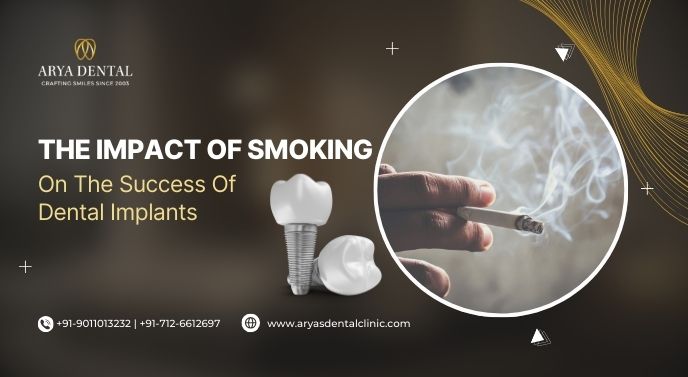
Dental implants are now used in many dental cases for patients with oral complaints. They enhance function and appearance while improving oral health, too. However, the chances of success of implants depend on certain factors, such as smoking. This blog highlights the effects of smoking on the success of dental implants and how to make your implants heal better.
Understanding Dental Implants
Dental implants are surgical structures that replicate the roots of teeth in the jaw. They allow dental prosthetics to stay in the mouth while supporting daily activities like oral hygiene, eating, and speaking.
The first phase of the dental implant is marked by implant placement in the jaw, followed by osseointegration when the implant fuses with the jaw to be stronger like the natural root of teeth.
Then, the titanium post is attached to it, and the prosthesis is attached to the implant. Dental Implants provide natural-looking and strong artificial teeth, restoring functionality and aesthetics.
How Smoking Affects Oral Health
Smoking gradually decreases oral health. The gum’s natural ability to heal and fight infection reduces, causing the development of gum diseases. The Nicotine and chemicals in tobacco reduce the blood flow to the gum, leading to insufficient oxygen supply and nutrients while impairing the healing process.
Smoking also leads to bone loss in the jaw, introducing oral health issues and a visibly shrunken experience. While cigarettes are harmful to oral health, other alternatives like vaping are no better or safer option either. Hence, it is required that you avoid all smoking products for better oral health.
Smoking and Osseointegration
Osseointegration is the process of integrating the implant with the jaw bone, which ensures its strength. Strength, in turn, determines the success of these implants. Smoking hinders this procedure by causing infections in the gum and delaying it. Another contributing factor to this delay in osseointegration is the presence of harmful chemicals in tobacco. This can cause a significant chance of implant failure in smokers.
Increased Risk of Complications
Smoking has been shown to significantly increase the risk of oral complications such as gum infection in the operated area, bone loss in the jaw bone, and peri-implants, which are inflammation around the implant.
Smoking increases the risk of these complications while decreasing the healing ability of the gums. Toxins in tobacco also cause damage to oral tissue, which can lead to other serious concerns, such as oral cancer.
Smoking and Dental Implant Success Rates
It has been studied that the success rates of dental implants in smokers are lower than those of non-smokers. This is usually due to a weak gum and immune system that either takes longer to heal or completely fails. Other reasons for higher implant failure rates in smokers also include dry mouth, irritation caused by the smoke, erosion of bone, and inflammation of the gum. Tissue health is also compromised in smokers and can lead to other oral infections.
Recommendations for Smokers Considering Dental Implants
It is often recommended for smokers to get clean sometime before the implants, which is to stop smoking some time before the procedure and also avoid it during the osseointegration process to help the implant heal faster. Stop smoking a few weeks before the dental implant procedure. This would help in allowing the body to accept the implants.
Long-term Maintenance and Care
Maintaining good oral hygiene is essential for people who have undergone implant treatment. Smokers should follow this more strictly to help the implant integrate better with the bone. Regular brushing and flossing combined with routine dental checkups can help maintain the procedure's results, which do not fade away quickly or require a re-implant treatment. Professional cleaning can also help remove the plaque and tartar buildup caused by tobacco and reduce the chances of infections.
Conclusion
Smoking causes significant damage to oral health, and it can be drastically worse in case after getting a dental implant. It can affect oral health, disrupt osseointegration, peri-implantitis, and other conditions. Smoking should be stopped for a few weeks before the procedure and be completely stopped during the healing process to avoid such situations.
This would ensure the success and longevity of these implants and enhance dental structure. You must consult your doctor and be vocal about your daily habits and diet before finalizing an implant surgery. Dental Implant in Nagpur compulsorily requires you to improve your oral condition to fit the standards to get an implant surgery.
To learn more about dental implants, visit our website.